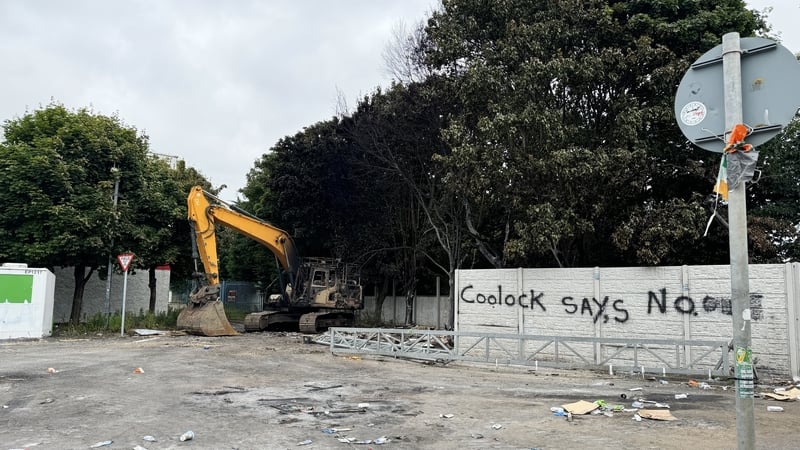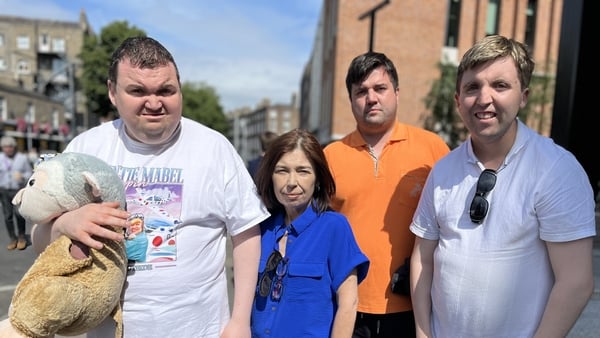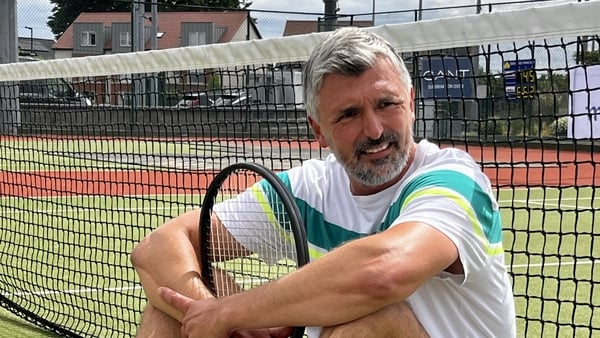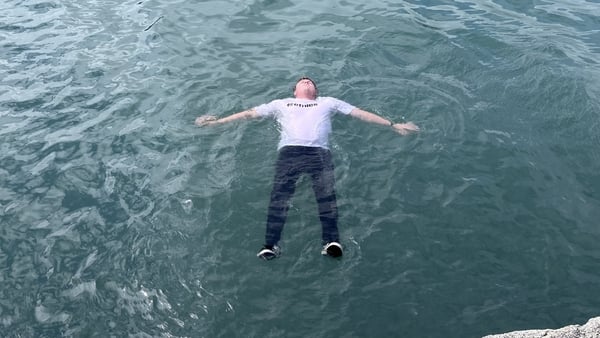Local groups and representatives have accused officials of a lack of engagement over plans to house international protection applicants in Coolock, north Dublin.
They have also condemned the violence that closed down parts of their community for a significant part of yesterday.
The events were still fresh in the minds of people today, with opinions divided on the issues that have fixed attention onto the area.
A number of people who spoke to RTÉ News gave a variety of views.
"I'm delighted they've done it," said one man. "They shouldn't be bringing migrants into the country … the Irish should be housed first."
A woman leaving a house on the main street said: "It says an awful lot about that, that it brings hordes of people into the one area, and the area itself gets the reputation, and it's not even the locals causing the problem."
We need your consent to load this rte-player contentWe use rte-player to manage extra content that can set cookies on your device and collect data about your activity. Please review their details and accept them to load the content.Manage Preferences
Another woman said: "I didn't like the disturbance but at the end of the day, people are right in what they are doing, they're standing up for their community."
"Each to their own," said one man at a bus stop, "people have to live somewhere".
Just a few minutes drive from the site of the disturbances last night, violence is the office of the Northside Partnership.
Concern has been raised at the number of young people involved in the disturbances, with the Chief Executive of Northside Partnership saying there are questions over the political motivations of some of those involved.
The majority of people in Coolock have stepped up to welcome people into the community, Paul Rogers said.
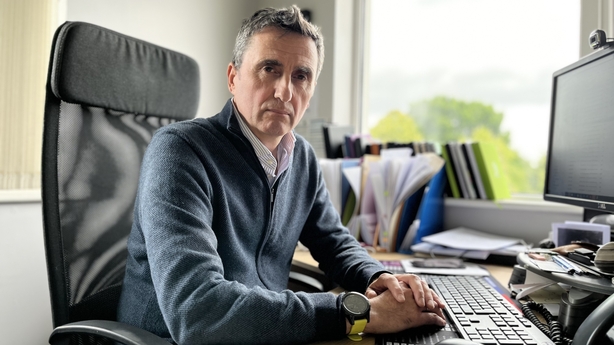
However, people were not surprised at what happened given the scale of protests at the proposed site to accommodate International Protection Applicants in the area, he added.
Speaking on RTÉ's News at One, Mr Rogers said that "it's a very challenging issue with the ongoing protest at the encampment," and that the protests had been constant in recent months.
"Nobody condones what happened, but there are a lot of mixed views about the site and the scale of the proposed development ... it's just quite challenging."
We need your consent to load this rte-player contentWe use rte-player to manage extra content that can set cookies on your device and collect data about your activity. Please review their details and accept them to load the content.Manage Preferences
Mr Rogers said local organisations have opened their doors to facilitate cross community engagement as well as English language classes.
"People are stepping up and helping out in any way they can to welcome people into the community", he said, but there had been no communication until yesterday from the Department of Integration since meetings were held in April.
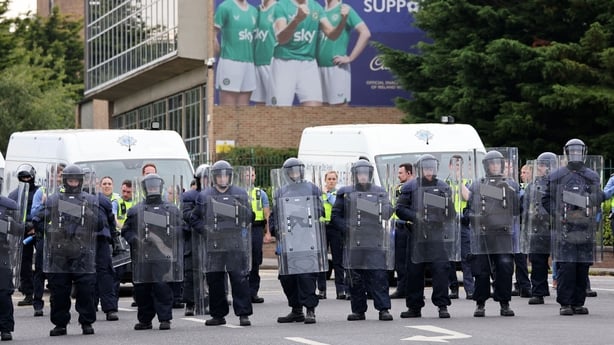
He also expressed concern at the number of young people who were involved in yesterday's disturbances.
The question remains as to whether they got involved due to political motivations, or whether they took an attitude they were there anyway and should participate, he added.
Mr Rogers said the Northside Partnership had recently reached out to other community and voluntary organisations in the area to get a sense of the challenges in integration, to try address the rhetoric and misinformation, and find ways to engage with people to unpick the myths around it.
Read More:
Coolock protests hijacked by 'thugs', says Taoiseach
Clear delay in deployment of public order unit in Coolock, says GRA
From morning to night: How the clashes in Coolock developed
Mr Rogers added that there was a need for leadership at the Department of Integration or local authority level and that one of the challenges has been the lack of investment in community and voluntary services since the economic crash of 2008.
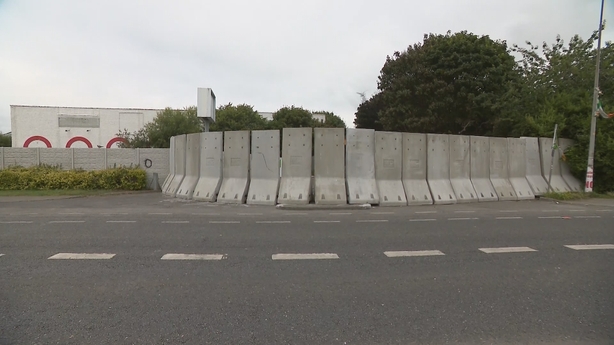
According to the last census data, deprivation has grown in the area since 2016 and Government investment has not returned to where it was before 2008, Mr Rogers said.
The integration work is only being funded on a short-term basis, he said, when it is not a short-term challenge.
He said the work of the partnership needs to be funded in a much more structured and coherent way over a longer term in an area where services are already under pressure.
"People have concerns with other people having additional needs coming into the area, that it’s going to put further pressure on services and supports," he said.
According to local representatives, there has been a lack of engagement over the Government plans here, and that created a gap which others filled.
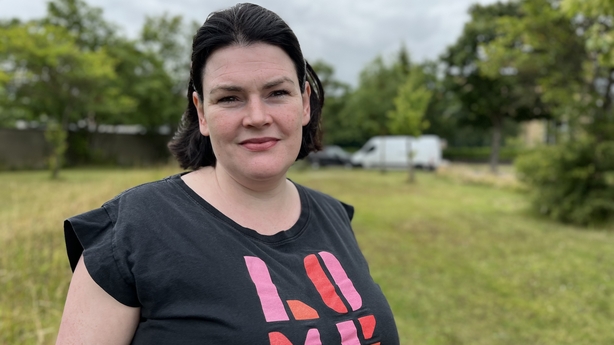
"You had people sitting on the site for months now in Coolock. Unfortunately, where you don't have positive information, where you don't have any information, what you end up with is a vacuum," says Social Democrats councillor, Catherine Stocker.
"The vast majority of people are not against people coming into the community per se, but they are getting their information from online sources that are often filled with intentional disinformation," she says.
"There absolutely has been a lack of engagement.
"The department pulled together one meeting in April in response to the rumours emerging that international protections applicants were going to the site.
"But really, there was a failure to bring all the relevant organisations together and I think there's a missed opportunity here because the opportunity was to create an alternative narrative," Ms Stocker said.
"The vast majority of people in this area are welcoming, want inclusion, want a positive, diverse society."
Shock at level of protests
A Youth Justice Project Leader with the KEEP Project in the Coolock area has said he was really shocked to the level and gravity that the violent protests progressed to yesterday.
Speaking on RTÉ's Drivetime, Keith O'Driscoll said he expected a flare up at some point, but not like this.
He explained that from watching videos on social media, he spotted a young person he worked with and made contact with them, and told them to get out of there before having an informal conversation with them today.
He said that a lot of young people went down for a look, as their curiosity naturally kicked in and this can mean they got caught up and embroiled in it, and that happened with a lot of young people locally.
"It was disturbing for me to see that," Mr O'Driscoll said.
He said youth workers contacted every young person today and checked in on whether they attended, what they thought, etc.
From his perspective, there was not much engagement with the Department of Integration when it came to the housing of asylum seekers in the area, he added.
He said that there was not engagement with the broader community who have the concerns, rather the meeting that was held was with community leaders and public representatives.
Asked what the concerns in Coolock about the asylum seekers are, he said that people are afraid of the unknown, describing Coolock as a settled community.
He added that the public have concerns around housing, and see those seeking international protection as being housed or getting supports from the Government before them, seeing that as unfair.
